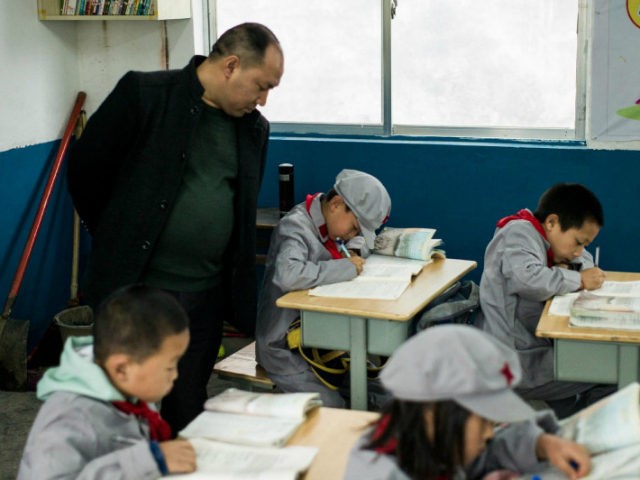Chinese Education Minister Chen Baosheng announced on Monday that school textbooks are already being rewritten to include President Xi Jinping’s contribution to Communist Party dogma, even though the new dogma has not yet been officially ratified.
Chen said that “Xi Jinping Thought,” as the current president’s ideology is informally known, will “go into textbooks, into classes, and into the brains” of Chinese schoolchildren at every grade level across the country. The South China Morning Post notes that a more formal name will likely be assigned to the ideology when it is officially incorporated into Communist doctrine by the Party Congress.
“Chen said the ministry would start amending textbooks and training teachers after the Congress as part of the education sector’s ‘historic task.’ The topic will become part of political ideology courses that all pupils and students in the education system are required to take,” the SCMP reports.
The new textbooks will also include more “explicit expressions of socialist values and party leadership” and less discussion of harmful “Western ideas.”
Education Minister Chen said schools have lately been dwelling too much on “historical nihilism, populism, extreme liberalism, and so on,” but the new Xi-infused curriculum will result in more Marxism and less “noise.”
Chen insisted there will still be plenty of academic freedom in Chinese classrooms. “There is no limit in doing research,” he explained. “But you are not allowed to voice dissidence in the classroom. You must follow my textbooks.”
As the report goes on to explain, political indoctrination is part of Chinese education from the first grade onward, with children of roughly American middle school age learning the “guiding principles” of previous Communist leaders like Mao Zedong and Deng Xiaoping.
Part of Xi Jinping’s contribution to dogma involves changing the goal of Chinese government into reconciling “unbalanced, inadequate development” with “the people’s ever-growing needs for a better life.” This is seen as a more modern social critique than the previous focus on “backward social productivity” before China’s recent modernization campaign. A good deal of the new curriculum appears to be focused on getting the kids to appreciate what a great job Xi Jinping has done at bringing China into the twenty-first century.
The New York Times offers a queasy look into China’s modernized classrooms:
With the fiery zeal of a preacher, Xie Hong addressed her class of 50 fourth-grade students, all in matching red tracksuits.
“Today’s life is rich, blessed, happy and joyous,” she said. “Where does our happy life come from? Who gave it to us?”
In Ms. Xie’s classroom at the Workers and Peasants Red Army Elementary School, there was only one correct answer, and she had worked tirelessly to ensure her students knew it.
“It comes from the blood of revolutionary martyrs! From the Red Army!” said a 9-year-old boy, Li Jiacheng. The class burst into applause, and Ms. Xie beamed.
The Times sees Chinese students getting more “Communist Party lore,” including “glorified tales” of China’s military victories and civilizational achievements, but less “discussion of iconoclastic writers” whose social criticisms might inspire thoughts of disobedience. Quite a few of those “glorified tales” seem to feature the Japanese as villains.
Evidently, some Chinese parents are less than impressed with the Xi regime’s push for more indoctrination, arguing that they want their kids to learn math and science, not propaganda. The NYT cites specific complaints that instruction in traditional Chinese medicine – presented as a source of national pride – is crowding out biology and chemistry. At the university level, scholars are complaining of the worst restrictions on free speech since the Tiananmen Square massacre. Critics condemned the whole educational agenda as a transparent attempt to keep Chinese youth from being seduced away from the Communist Party by exposure to the Internet.
The Diplomat notes the new curriculum quotes more extensively from “traditional Chinese literature,” spends more time discussing the “brilliant achievements” of Chinese history, expands the official length of the “War of Resistance Against Japanese Aggression” by six years, and hammers home the concept of disputed territories such as Taiwan and the South China Seas islands as “historical and inseparable parts of China.”
Perhaps those concerned about the threat China poses to the West in the new century can take some comfort from knowing the Communists are insecure enough to lay the propaganda on this thick and that the kids seem to know they are being brainwashed.

COMMENTS
Please let us know if you're having issues with commenting.